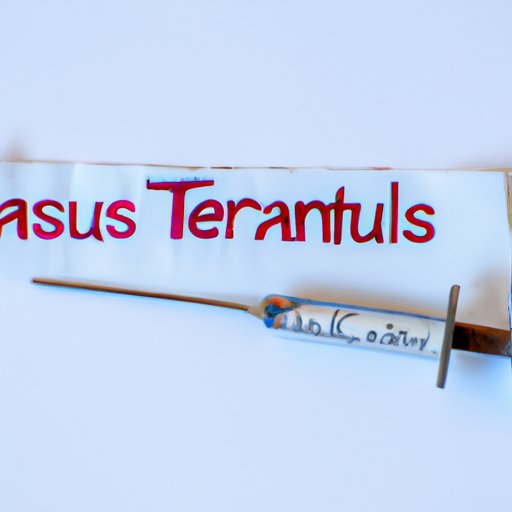
I. Introduction
Tetanus is a serious bacterial infection that can cause muscle stiffness, spasms, and even death if left untreated. The good news is that there is a vaccine available to help prevent the disease, known as the tetanus shot. In this article, we’ll explore when you should get a tetanus shot, the risks and benefits associated with it, and what to expect from the vaccine.
II. The Importance of Tetanus Shots: Understanding the Risks and Benefits
Tetanus is caused by a bacteria known as Clostridium tetani, which can enter the body through a cut, wound, or scrape. Once inside, the bacteria can produce a toxin that affects the nervous system, leading to severe muscle stiffness and spasms.
The risks of getting tetanus are high when you come into contact with soil, animal feces, or contaminated objects. People who work in outdoor environments or with animals are at a higher risk of contracting the disease. However, tetanus can affect anyone who has an open wound.
Getting a tetanus shot can help prevent the disease by producing immunity to the toxins produced by the bacteria. The vaccine is safe and effective, with minimal side effects.
III. Don’t Wait Until It’s Too Late: The Right Time to Get a Tetanus Shot
It’s recommended that you get a tetanus shot every 10 years to maintain immunity to the disease. However, if you experience a cut or wound, it’s important to check your vaccination history and schedule a tetanus shot if necessary.
You may also need a tetanus shot if you’re experiencing certain symptoms, such as muscle stiffness or spasms, fever, and headaches. If you’ve been exposed to soil, animal feces, or a contaminated object and haven’t had a tetanus shot in the past 10 years, you should also schedule an appointment for a tetanus shot.
Symptoms of tetanus can appear anywhere from three days to three weeks after exposure to the bacteria. The earlier you receive treatment, the better your chances of recovery.
IV. How Often Should You Get a Tetanus Shot? The Experts Weigh In
The Centers for Disease Control and Prevention (CDC) recommends that adults receive a tetanus shot every 10 years. However, certain factors may affect how often you need a tetanus shot.
If you have a weakened immune system or experience frequent exposure to tetanus-causing bacteria, you may need to receive a tetanus shot more frequently than every 10 years. Additionally, if you experience a severe cut or wound, you may need a tetanus shot if it has been more than five years since your last vaccination.
V. 5 Signs It’s Time to Get a Tetanus Shot: What You Need to Know
There are several situations that may require a tetanus shot. Here are five signs that it’s time to get vaccinated:
- You’ve experienced a severe cut or wound
- You’ve been exposed to soil or animal feces
- You’ve been in contact with someone who has tetanus
- You haven’t had a tetanus shot in the past 10 years
- You’re unsure of your vaccination status
Symptoms that may indicate a need for a tetanus shot include muscle stiffness, spasms, and difficulty swallowing.
Note that not all cuts or wounds require a tetanus shot. If the wound is minor, clean, and wasn’t caused by a dirty or rusty object, a tetanus shot may not be necessary.
VI. Tetanus Shots: The Key to Keeping You and Your Family Safe
Tetanus shots are important for both individuals and families. By receiving the vaccine, you can protect yourself and others from contracting the disease.
The vaccine not only prevents the disease in those who receive it but also helps to provide herd immunity. This means that even those who can’t receive the vaccine due to medical reasons are protected when people around them are vaccinated.
If you have children, it’s especially important to make sure they are up to date on their tetanus shots. The vaccine is part of the routine childhood vaccination schedule and is typically given at ages 2, 4, 6, and 18 months, with booster shots at ages 4-6 and 11-12 years.
VII. The Tetanus Shot Timeline: What to Expect and When to Schedule Your Appointment
A tetanus shot is typically given in the arm and is a quick and easy procedure. You may experience some pain, redness, or swelling at the injection site, but these symptoms should subside within a few days.
The effectiveness of a tetanus shot typically lasts about 10 years. After this time, you’ll need to schedule another vaccine to maintain immunity to the disease.
If you’re unsure of your vaccination status or think you may need a tetanus shot, contact your healthcare provider to schedule an appointment.
VIII. Conclusion
To recap, tetanus is a serious bacterial infection that can be prevented with a tetanus shot. It’s important to stay up to date on your vaccinations and to seek treatment if you experience symptoms of the disease.
If you’re unsure of your vaccination status or think you may need a tetanus shot, don’t hesitate to contact your healthcare provider. By taking this step, you can protect yourself, your loved ones, and your community from the risks of tetanus.
Remember, prevention is key when it comes to maintaining good health, and a tetanus shot is an important part of this process.




